The Discreet Charm of the Okavango Delta
(Marie-mail #46)
VICTORIA FALLS TO KASANE
AUGUST 21
"I just met our driver," he said. "He came up to me in the shower, naked, stuck out his hand, and said 'Hi, I'm Fortune!'"
Fortune turned out to be a Zimbabwean, a safe and responsible driver, and an excellent conversationalist. He was a freelancer, who normally worked for Guerba. I never did find out if there was a usual driver assigned to our route who was on vacation, or what.
Our Nomad truck, unfortunately, was certainly on vacation. "Marvin," presumably named after Marvin Gaye as Nomad trucks are named after dead musicians, was on our "Chobe and Delta" route. Marvin was quite ill at the moment and we'd had an eleventh hour substitute brought in. Fortune called her Janet, but I don't think she actually had a name as she was not a Nomad truck and was a mere rental.
You can do things like rent an overland truck in Africa. East and Southern Africa are crawling with so many overland trucks that it is actually fairly easy to get a hold of one in an emergency.
Janet was mechanically sound, but as far as overland trucks go, she was crap. She had everything I hate in an overland truck, and everything Nomad has worked hard to NOT have on its usual vehicles.
Nomad's trucks are state of the art. They're the Jetsons edition of overland trucks, almost to the point where you press a button and out falls a kitchen.
The only button on Janet emitted a sharp buzz that would annoy Fortune every time someone needed a toilet stop.
Janet had canvas, roll-up sides, good only for slow-speed wildlife viewing, but with bad visibility and cold at fast speeds. I suspect they're dangerous in accidents as well.
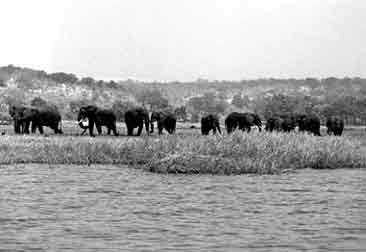 Chobe elephants
Chobe elephants
There was no contact between passengers and crew. Most Nomad trucks have a window so the two can communicate. Christine made do with scrawling hasty notes, sticking her head out of the cab skylight, and holding the notes where we could see them.
Also, only half the seats were forward-facing. The others faced inward, so passengers would have to look at each other, not at the Botswanan countryside. Lucky for us, with only six passengers, it didn't matter.
I was not accustomed to the division of labor on our trip. I had traveled with Dragoman in the past, whose drivers were also leaders, guides and mechanics. Some overland companies follow this model, while others have a driver and leader, and still others also have a cook.
I had begun to understand my Namibian pal Sam's aversion to overland trucks. It wasn't the concept -- the idea is quite a clever one, to have self-contained movable worlds of food, shelter, and transport. Overland trucks are useful as home and transportation through different regions, and I am indebted to Dragoman's truck Oscar, who had faithfully carried me through Pakistan and Iran.
No, the problem with overland trucks in Africa lies in their popularity. There are dozens of overland companies there, catering to various budgets. Some companies work hard to sensitize passengers to the regions they're traveling through, promoting responsible tourism and cultural understanding. Others act as parties on wheels, and pity the poor solo camper when one of these (or two, three or up to six) pulls into a campsite, and 23 beer-guzzling passengers pour out.
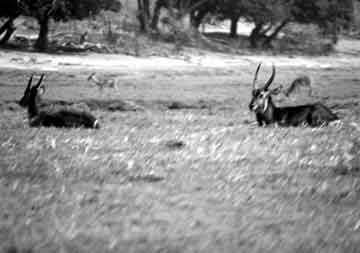 from the Thebe River boat safari
from the Thebe River boat safari
And here I was, boarding an overland truck in spite of the apprehension I had recently developed!
Why, you may ask, was I doing this?
When I was researching Botswana, it had become apparent that it was prohibitively expensive and every trip I could find was outrageous. Only the six-day Nomad trip was reasonable.
Botswana is relatively wealthy, having made a fortune in diamonds. It's an African success story, with a stable government, thriving economy, and unified population. Botswana caters to the luxury tourism market, and does not encourage budget travel.
With good reason. Uncontrolled mass tourism damages environments and threatens ecosystems. Countries in need of hard currency overlook the effects of rampant tourism, but rich Botswana could afford to be choosy about its customers.
We drove out of Zimbabwe, with its currency crisis and chaos, and into diamond and elephant-rich Botswana.
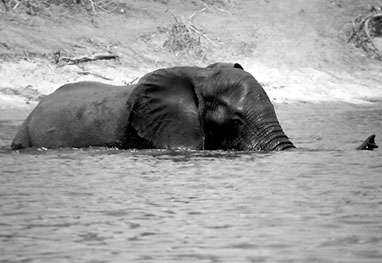 Chobe has a lot of elephants
Chobe has a lot of elephants
It was a short ride to Kasane, gateway to Chobe National Park.
We parked at Thebe River Safaris.
"We'll put up your tents for you," said Christine. "Now who wants to go to town to the bank with me?"
Everyone agreed to go, and we popped in to the exchange bureau for Botswanan currency. The exchange bureau was in a tiny, upscale shopping center, next to an air-conditioned modern communications store complete with two fast, internet connections.
"Marie, it's time to go." Someone had to fetch me as I'd attached myself firmly to the e-mail facility.
 not just elephants at Chobe
not just elephants at Chobe
We drove to a gas station "for drinks." Obligingly, us passengers purchased a few juices and sodas and got back in the truck. The Shell kiosk was out of water.
Fortune drove us to a dirt road and then to a pier. Now we were confused.
"We're going on our boat safari now? I guess I missed the bit where we were told we were stopping at the Shell to buy water for our boat trip," I said.
Everyone else turned out to have missed this too, so I fell in step next to Christine.
"This is probably a bad time to mention this," I started. "But the Shell station was out of water."
I figured Christine had screwed up by not clarifying that we needed boat supplies. She was new to the job, but seemed likely to grow into it. She reacted quickly.
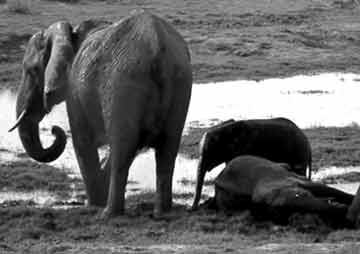
"Then let's go get some water."
We got enough for everyone.
Our group was small enough that we were able to go out on a small Thebe River Safaris motorboat instead of on a big pontoon-type boat. It had a canopy and a driver, two necessary things for a sunny river trip. Our lunch had appeared while I'd been busy buying water, and a small cooler occupied a corner of the boat.
We motored out onto the river, spotted some birds, and almost immediately happened upon hordes -- I mean herds -- of elephants.
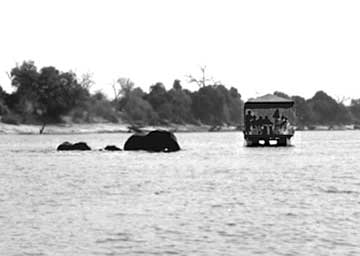 good view
good view
There are over 65,000 elephants in Chobe National Park, and I think we saw about half of them. We saw swimming elephants, trumpeting elephants, bathing elephants, flatulent elephants, and elephants rolling in the mud. We also came across several vicious-looking crocodiles, many hippos (my first!), and several attractive species of birds. The Thebe River Safari trip was excellent, a real African highlight, especially when two hippos staged a sparring match for us.
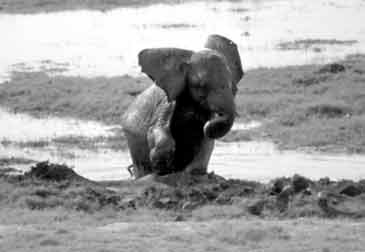
I was ravenous by the time we pulled over to the bank for a 3:30 lunch. Thebe River had packed us macaroni and cheese, but the staff had kindly included some chicken for the dietarily-challenged among us (I cannot eat dairy and Marcel could not eat wheat).
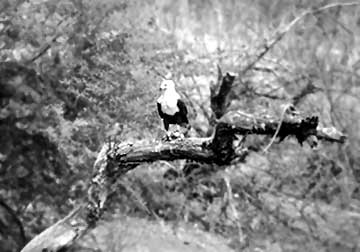
Unfortunately, they neglected to include enough plates and utensils for all of us, so we improvised, eating off Tupperware lids with our fingers. Couples shared forks. I wished I had a napkin to get the salad dressing off my fingers.
Back on land, we were driven back to camp, deposited instantly on a Toyotas 4x4, given four Dragoman passengers to fill out our vehicle, and sent off on a sunset game drive.
 hippos spar off
hippos spar off
The driver warned us that things were slow, and that all the lions seemed to have gone away on holiday.
He was right. We saw almost nothing -- except for a few hundred million more elephants and a couple of giraffes, impala, kudu, and a flat tire.
I was getting to be an old hand at flat tires -- we'd had one with "Crazy Kudu" as well. African dirt roads are hell on wheels, so to speak. Our own spare was lacking air and a jack, but another 4x4 stopped to help us out.
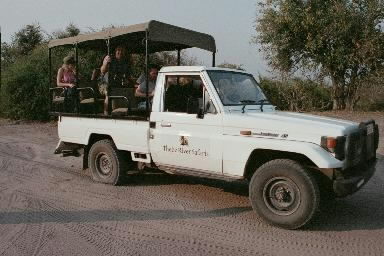 driving safari
driving safari
Unfortunately, the same 4x4 had its own flat just twenty minutes later! We stopped to help it out in return.
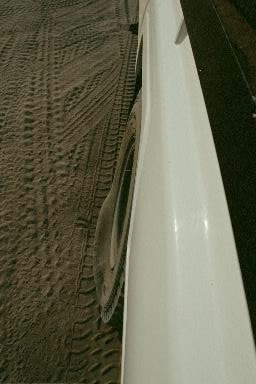 another flat in Africa
another flat in Africa
It was dark when, exhausted, we arrived back at Thebe River Safari Camp. I stumbled back to our campsite, and was surprised to find it occupied by a real Nomad truck, a different leader, and an entirely different group.
Christine caught up to us.
"Another Nomad truck took our campsite while we were out," she explained. "We're next door now."
The seemed funny to me -- on the overland trips I'd taken through the Middle East and Central America, I'd seen exactly three other overland trucks over the combined twelve weeks. But here at Chobe, I saw more than twice at many simply by shaking my head and using my peripheral vision.
 Chobe fight
Chobe fight
Each truck, two of which were from Dragoman and three from Nomad, contained six to 23 passengers and two to three staff.
I looked around and counted four toilets and a few showers, and realized where I was.
I was in overland hell.
My ex-Dragoman driver friend, Nikki, had warned me. She knows that I have anti-social tendencies, and contempt for drunk backpacking scenes.
"Overlanding in Africa is nothing like it was in Iran or India," she had warned me. "You can't usually bush camp because it's illegal in most national parks, and it's dangerous. So you have to stay in campsites where there will be loads of overland trucks, a big, party scene, and a long line for a cold shower."
And when an interviewer from a financial magazine called me up last year for an insider's view on adventure travel, I'd spoken positively about overland trucks.
"They're a great way to see remote areas on a tight schedule," I'd explained. When the article came out, trashing overland and adventure travel, I could see why the writer didn't quote me.
But if the interviewer had asked me at the moment, I would have said that overland trucks were cattle cars with beer.
To be fair, my own spacious truck had room for 23, but only six of us were on board. And the Dragoman group that had come from Kenya told me that they'd managed to got way off the beaten path several times, and had loved it.
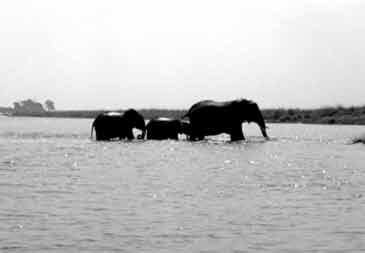 elephant crossing
elephant crossing
But I was rapidly coming to the realization that overlanding in Africa was not for me. The throbbing music coming from the bar, the laughter of the group drinking beer and playing darts -- this wasn't the Africa I'd come to see, although for a more social person, it was probably a great party. I was banking on the trip I'd take later in Ethiopia being different -- almost no overland groups, aside from Dragoman, went to Ethiopia.
I sat apart from the group as we waited for our chance to go to the braai, or barbecue. Finally, we sat down to a great meal of Thebe River steak, potatoes, and salad.
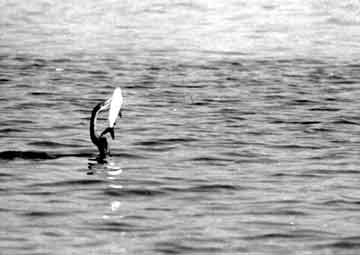 not Nessie
not Nessie
Fortune sat across from me. I mentioned that I was not too keen on Victoria Falls at the moment, with its monetary crisis.
"It's Mugabe, isn't it?" I asked. I had read that the President's policies were strictly designed to win him the upcoming election, and had driven hard currency from the country.
"Robert Mugabe is a great man," explained Fortune calmly. "The media is controlled by people who have an interest in seeing him lose the election."
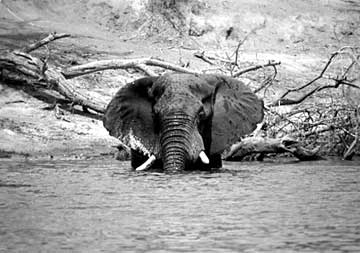
This was a totally different viewpoint than the ones I'd heard, and I was of the opinion that the media within Zimbabwe was more controlled that the external media. I was under the impression that while espousing land reform, Mugabe had gone back on his promise of compensation to white farmers, instead seizing the land or encouraging supposed war veterans to take it by force. Investors and tourists had skittishly backed off from Zimbabwe, to wait and see what would happen. This created a hard currency crisis, which in turn lead to fuel shortages.
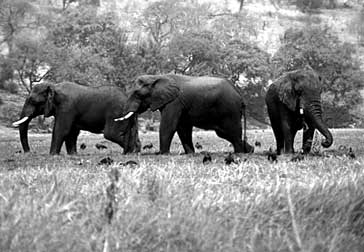 Chobe elephants
Chobe elephants
But Mugabe was something of a legend to some Zimbabweans, having been president for two relatively successful decades, and some Zimbabweans were still loyal to him.
KASANE TO MAUN
AUGUST 22
I got up early to beat the crowds to the few toilets and sinks. I'd just covered my face in oil-free soap, when the water cut off.
It wasn't just a lack of hot water. I was a lack of any water altogether. I used bottled water to remove the soap, and then watched the overland trucks pack up and leave.
Someone rolled up a canvas window on Janet. At first it was too cold, but we were grateful for the breeze in the heat of the day. We pulled over for a toilet stop in a flat area.
"Can we stop next time we see a big tree or bush?" I groused to Fortune.
"There's some sunflowers over there," said Christine brightly.
I looked at them with skepticism and opted to wait.
I didn't need to wait long. Botswana is dotted with foot-and-mouth-disease control points. Vehicles must driver through a pit of muddy-looking disinfectant, and passengers are required to stamp their feet on a wet rag, purportedly moistened with disinfectant, but more likely moistened with filth and mud.
Dragoman was holding up the line, and traffic was stalled. We all got out, stamped our feet obligingly on the muddy mat, and asked the Dragoman passengers what was wrong.
"They took our meat! Now we have no dinner," they reported ruefully.
I found a girl-toilet-sized bush. It was much nicer than a sunflower.
Our lunch stop was, predictably, for pink lunchmeat and mayo sandwiches. We drove on through the salt plains, down a flat, paved road towards Maun.
Maun itself was small, although it is the fastest-developing town in Botswana. It featured a Woolworth's, Shop-Rite, PostNet (Southern Africa's version of Kinko's), BP, and Shell, among other stores. But we weren't staying in Maun -- we were driving ten kilometers further to Audi Camp in Matlapaneng.
Audi Camp was shady and pleasant. There was not just plenty of running water, there was plenty of hot water as well. The sites were well-spaced and the other overland trucks, while not invisible, were less prominent than they'd been on the previous night.
By now, I knew that I didn't want to go out into the bush and camp with the mosquitoes. And one look at Maun had showed me that it was no place to spend the coming weekend. My original plan had been to return to Victoria Falls, to the Zambian side, and stay there.
But now I knew there was nothing to do on the Zambian side, and the Zimbabwe side was filled with touts. I made a few inquiries and came to a conclusion.
I had to go somewhere, and posh tourist transport didn't run until Sunday. Today was Wednesday.
I split from the group. I'd go with Audi Camp on a daytrip into the Delta, while my group stayed there overnight, and then I'd take local transport back to Windhoek on Friday. It was about eight hours away, and if I left early I'd get all the way to Swakopmund, where I'd rest for the weekend and maybe get in some sand dune quad-biking.
Christine cooked our dinner -- ground beef over rice. It wasn't real participation -- she and Fortune did the work and we had only to do the dishes. But we weren't complaining.
MAUN
AUGUST 23
One of the Nomad passengers, on the condition of anonymity, put it bluntly later.
"The entire infrastructure of Maun is built around the fraud of the Okavango Delta."
Another of my group was more forgiving.
"The Delta probably has all kinds of wildlife and interesting scenery. We just didn't see it."
Later, I met some travelers who confirmed the latter; they'd seen hippo, elephant, and even elusive lions while in the Delta.
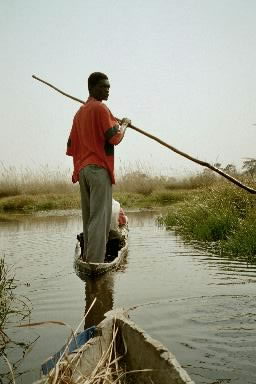 Delta poler
Delta poler
The appeal of wetlands is always subtle. You need to know what to look for and why, for example, a certain bird or plant is unique.
My Nomad group (minus Fortune, who stayed behind with the truck) went in one 4x4, and I left Audi Camp in another. We were all going to the same poling station, but I was going with the day trip, and my Nomad group was carrying camping gear for a night in the Delta.
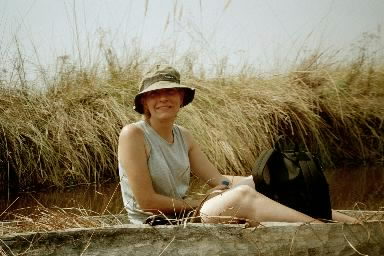 Marie in stupid hat
Marie in stupid hat
First, we all followed guides to a hippo pool. The hippos sat there and looked at us. A croc looked at them. I would probably have been a lot more impressed if we hadn't seen dozens of hippo the two days ago at Thebe River. Finally, we moved on.
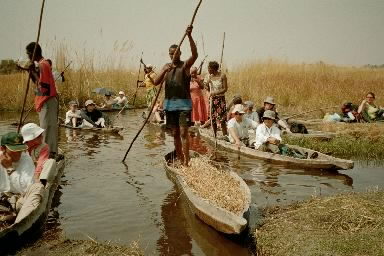
I was the usual odd one out and go my own mokoro. A mokoro is a shallow dug-out canoe. Poling one is the traditional way of getting around the Delta, which is shallow itself.
Nikki, my overland driver friend, had made me a present of a see-through waterproof bag before I left home.
"When you get to the Okavango Delta," she had said, "you will go on a mokoro trip. The poler will tell you their mokoro doesn't leak, but they're lying. All mokoros leak."
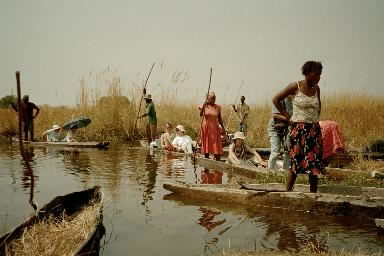
Dried reeds in the bottom of the mokoros served the dual purpose of providing cushioning and soaking up stray Delta water. I was the envy of the group with my Sealline 10 bag.
Ironically, my mokoro seemed to be the only dry one.
A group of about eight polers assigned us all to mokoros. What surprised me was the female polers. They wore full knee-length skirts and poled alongside the men. Equal-opportunity poling.
Off we poled in a row of eight mokoros, through narrow channels. Reeds didn't just obscure the view -- they were the view. They were part of the Delta, the wetlands we'd come to see.
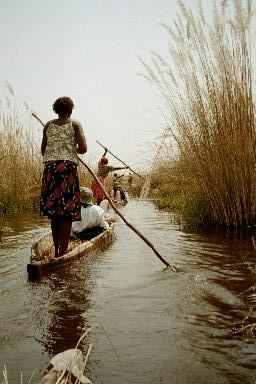 Del
Del
Occasionally, we'd see a waterlily or a bird. But Christine had warned us -- "you won't see any wildlife from the mokoros" -- and she was right. The wildlife was seen from game walks, once you were well into the Delta.
We did, however, see a fair number of relentless, pesky insects which buzzed about in spite of my perfume -- eau de insecticide.
The sun was equally relentless on our day-long cruise to nowhere. After a half-hour, I was ready to go back to shady, pleasant Audi Camp, but it wasn't an option.
We poled on to a toilet stop. The reeds were waist-high, and there were no trees. The men all went off to their reedy facilities, but the female tourists all looked at the reeds with apprehension.
I spotted a female poler stealing off into the bush and followed her. She went off a short distance and I learned the purpose of the full skirts. They were instant privacy -- portable loos.
When we spotted solid ground, we stopped for lunch. I munched my gourmet picnic -- peanut butter and jam on white bread and an apple that Christine had given me -- and was dismayed to learn that we planned to sit at our lunch spot for an hour and a half.
Finally, we poled back. I had adopted a zen approach to poling by now, and rested in the mokoro while the insects buzzed about me and the sun brutally beat down.
In spite of my learned nonchalance, I was relieved when we got back to the poling station. We all loaded onto an Audi Camp 4x4 and drove away, watching the polers push way from the bank on their way home. They really were driving their mokoros home -- this was no tourist gimmick.
It would take us about two hours to lumber up the dirt road to Maun and Audi Camp -- normally. Instead, it took us almost four due to a flat tire.
Our 4x4 was monstrous, the way 4x4's have to be when they're expected to ferry twenty tourists around dirt roads in Africa. The driver tried vainly to budge the lugnuts on the back wheel.
"New plan," he said. He hooked a hose to the truck's air compressor and tried to inflate the tire. But the puncture was too big and air escaped as rapidly as he pumped it in.
Defeated, he gave up. Then, an Italian tourist pulled out a cell phone. We could call Audi Camp and tell them to come and fetch us.
Sadly, we were out of signal range. We stared glumly. What now?
Several men of our party took up manual labor, trying to force the lugnuts loose with determined strength and levers.
It was looking hopeless when two local men approached. They had massive holes in their trouser knees, and somehow were miraculously carrying oil.
A cart and four donkeys approached as well, driven by children. The kids stopped and watched. They were as fascinated as we were bored.
"Eventually Audi Camp will notice we're late," said the driver.
Then, the men, aided by the oil, gave it a massive push. One Italian bounced up and down on the wrench, while the others pushed.
A lugnut moved. A feeble cheer went up.
They used the same technique on the remaining lugnuts, and then all hands were needed to lift the heavy tire off and replace it.
We pulled into Audi Camp at seven. My plans to check out Maun had self-cancelled.
 and another flat
and another flat
Filthy and exhausted, I wanted a shower. I walked back to camp. Fortune was nowhere to be found.
I couldn't very well expect him to wait for me forever. I hit the truck, angry at the locks that kept me from my soap and clean clothes.
"Who is it?" The truck hadn't spoken to me -- it was Fortune, sleeping in a nearby tent.
"I'm so glad to see you," I said, relieved. "Can you unlock my pack so I can have a shower?"
"There is only one problem," said Fortune. "My keys have gone with Christine to the Delta."
His joke fell flat and I stared a minute. He unlocked my pack and I walked to the relief of Audi Camp's hot outdoor shower.
NEXT: a harrowing, life-threatening hitch to Windhoek.